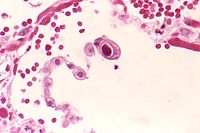
Photo from wikipedia
BACKGROUND Chronic hepatitis C is an independent risk factor for atherosclerosis and is associated with cardiovascular events. Mechanisms include inflammatory cytokines, endothelial dysfunction, and increased oxidative stress. AIM OF THE… Click to show full abstract
BACKGROUND Chronic hepatitis C is an independent risk factor for atherosclerosis and is associated with cardiovascular events. Mechanisms include inflammatory cytokines, endothelial dysfunction, and increased oxidative stress. AIM OF THE STUDY The objective was to evaluate the response of carotid atherosclerosis to treatment with direct-antiviral agents. METHODS We developed a prospective cohort study that included patients with chronic hepatitis C treated with direct-acting antiviral agents (DAAs), without cardiovascular disease, diabetes mellitus, significative chronic kidney disease or coinfections. Clinical characteristics, laboratory values and carotid ultrasound to measure carotid intima-media thickness (CIMT) and look for established atherosclerosis were performed at baseline and 3 months after completing treatment with DAAs. RESULTS A total of 24 patients were included. The mean age was 60 years and 79% were women. The prevalence of smoking was 41.7%, obesity 25% and hypertension 20.8%. Age, arterial hypertension, genotype, AST, glomerular filtration rate and cirrhosis were significantly associated with established carotid atherosclerosis. After treatment with DAAs, an overall significant reduction of C-reactive protein (CRP) levels was found (p = 0.004). A trend towards reduction of significant CIMT (>0.9 mm) (20.8 vs. 8.3%, RR 1.18, IC 95% 0.75-1.86, p = 0.29) and a statistically significant resolution of atherosclerotic plaque (45.8 vs. 41.7% RR 0.09, IC 95% 0.01-0.63, p = 0.001) was found. CONCLUSIONS Treatment of chronic hepatitis C with DAAs decrease carotid thickening, atheromatous plaques, and inflammatory markers like CRP. More studies are needed to confirm this finding and its impact on long-term cardiovascular outcomes.
Journal Title: Archives of medical research
Year Published: 2021
Link to full text (if available)
Share on Social Media: Sign Up to like & get
recommendations!